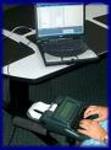What is Court Reporting
Court reporting is the verbatim reporting method used to record legal proceedings. The information reported is transcribed and produced into an official transcript, and is considered a legal document when completed by a certified court reporter. These legal transcripts are used in a variety of venues, including civil and criminal trials, depositions, meetings and conventions. Court reporters are also trained in closed captioning and CART reporting, used for assisting hearing-impaired individuals. You can see closed captioning by using the closed-captioning feature on your television.
In the state of Georgia, a court reporter is required to be certified and registered by the Georgia Board of Court Reporting. A court reporting firm providing reporting services is required to be listed and registered with the state as a court reporting firm. Effective January 1, 2009, all court reporters practicing in the state of Georgia must achieve RPR status or the voice equivalent. Please contact the Georgia Board of Court Reporting for more information.

Stenographic Realtime Reporting
Stenographic realtime court reporting provides the judge and attorneys with a text transcript while the proceedings are taking place; hence, it is called realtime translation. Realtime can be accomplished by both stenographic machine reporting and voicewriting reporting; however, due to technology advantages, is most often provided through stenographic reporting.
Not every reporter is a realtime reporter. The realtime reporter is specially trained and utilizes proprietory software and hardware, in conjunction with a laptop computer, to instantaneously turn spoken words into readable text.
Here you see a realtime reporter. Testimony is being taken down on the stenographic machine, which is connected to the laptop, and the spoken word is showing up in text on the laptop. If you were to see the entire setting, you may see the judge and/or attorneys with their laptops, able to view the spoken word in English, realtime (instantaneously). If requested, the reporter can print the text to deliver immediately to the attorney and/or judge.

In the days past, transcripts were only useful after the fact. With realtime, judges, attorneys and paralegals may view testimony instantly. Say, for instance, a witness has been testifying for several hours, and you need a portion of his testimony from three hours earlier. With a click of your mouse, you can easily find his testimony, mark it, issue codes, send selected text to people of your choice -- even communicate with others via instant messaging.
If the client prefers to avoid the entire hook-up scenario, skilled, qualified court reporters can provide a disk of the proceedings as the client leaves the deposition or court proceeding.
